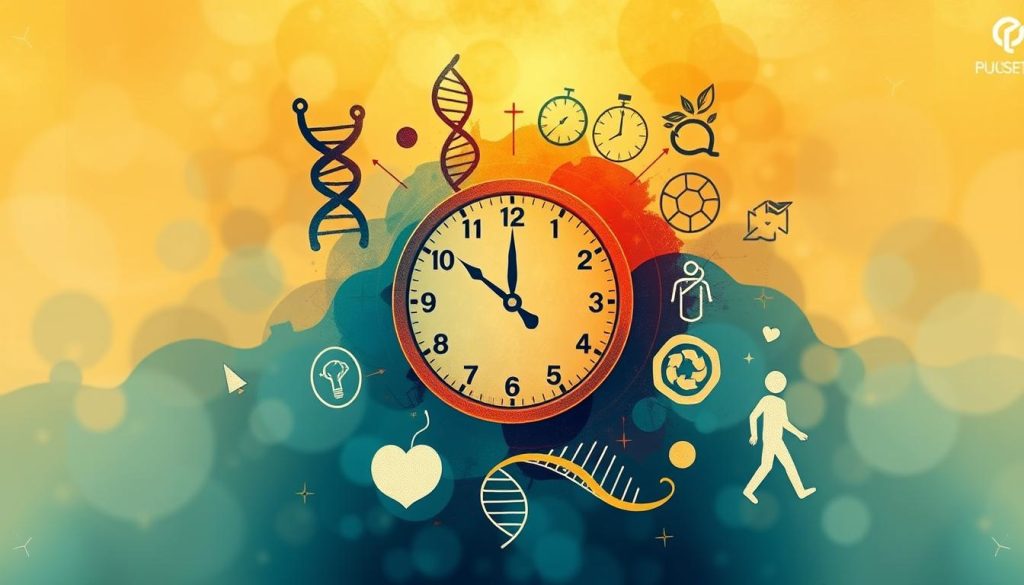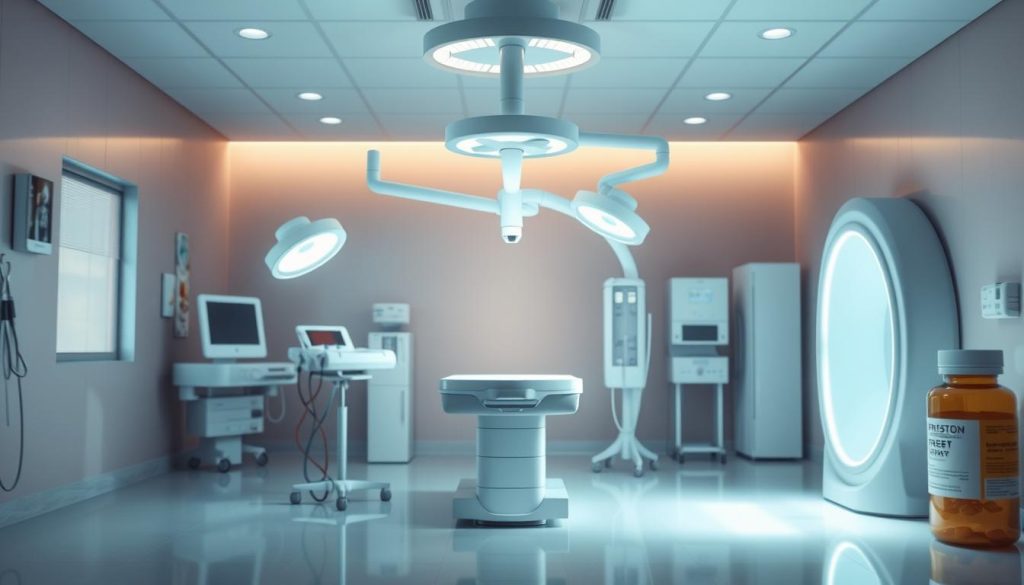Prostate cancer is a serious health concern for men worldwide. It’s important to understand the causes and risk factors of prostate cancer. This disease affects the prostate gland, a key part of the male reproductive system.
There are many factors that can increase your risk of getting prostate cancer. These include age, family history, and lifestyle choices. By knowing these factors, men can take steps to lower their risk and catch the disease early.
In this article, we’ll dive into the main risk factors and causes of prostate cancer. We’ll discuss how the disease forms and what you can do to protect your health. With this knowledge, you’ll be better prepared to make informed decisions about your prostate health.
Understanding Prostate Cancer Development and Common Causes
Prostate cancer happens when cells in the prostate gland grow too much. Learning how you get prostate cancer means looking at different factors that lead to it.
The Role of Cell Mutations in Cancer Formation
Cell mutations are key in prostate cancer. These DNA changes cause cells to grow and divide abnormally. Some mutations happen naturally, while others come from the environment or genes passed down from family.
Genetic and Environmental Factors Interaction
Prostate cancer is often caused by a mix of genetics and environment. Having a family history of the disease raises your risk. But, your lifestyle and exposure to certain substances can also cause cancer.
Hormonal Influences on Prostate Cancer Development
Hormones, especially testosterone, are important in prostate cancer. The prostate gland needs male hormones to work right. But, these hormones can help cancer cells grow if there are mutations.
| Factor | Impact on Prostate Cancer Risk |
|---|---|
| Age | Risk increases significantly after age 50 |
| Family History | 2-3 times higher risk with first-degree relatives affected |
| Race | Higher incidence in African American men |
| Diet | High-fat diets may increase risk |
While prostate cancer is common in men, other cancers can also affect them. For example, male breast cancer is rare but shares some risk factors with prostate cancer. This shows why it’s crucial to stay informed about health.
How Do You Get Prostate Cancer: Key Risk Factors Explained
It’s important to know about prostate cancer risk factors for early detection and prevention. Some factors we can’t control, but others we can manage through lifestyle choices.

Prostate cancer symptoms are often not noticed early. This makes knowing about risk factors even more crucial. Age is a big non-modifiable risk factor. Men over 50 have a much higher chance of getting this disease.
Family history also matters a lot. If your dad or brother had prostate cancer, your risk goes up. Genetic mutations, like in BRCA1 and BRCA2 genes, can also increase your risk.
Race also affects your risk. African American men have higher rates of prostate cancer. The exact reasons for this are still being studied, but it might involve genetics and environment.
- Diet high in red meat and dairy
- Lack of exercise
- Obesity
- Exposure to certain chemicals
These lifestyle factors can be changed to lower your risk. Eating more fruits and veggies, exercising regularly, and staying at a healthy weight can help.
Knowing these risk factors helps men take steps to prevent and detect prostate cancer early. Regular check-ups and screenings are key, especially as you get older or if you have several risk factors.
Age and Family History as Primary Risk Indicators
Understanding prostate cancer risk factors is key for early detection and prevention. Two main factors are age and family history.
Age-Related Risk Patterns and Statistics
Men’s risk of prostate cancer goes up with age. The American Cancer Society says about 6 in 10 cases happen in men over 65. Starting prostate cancer screening at 50 is important.
Hereditary Factors and Genetic Mutations
Genetics are crucial in prostate cancer risk. Men with a first-degree relative (father, brother, or son) with prostate cancer face a two to three times higher risk. Certain gene changes, like BRCA1 and BRCA2, can raise the risk of aggressive prostate cancer.
Family History Documentation and Screening
Keeping a detailed family health history is vital for prostate cancer risk assessment. Men with a strong family history should get screened earlier and more often. Genetic counseling can help evaluate hereditary risk and guide screening plans.
“Knowing your family history empowers you to make informed decisions about prostate cancer screening and prevention.”
While age and family history are beyond control, being aware of these risks can lead to proactive health steps. This can include timely screenings, potentially improving outcomes for those at higher risk of prostate cancer.
Lifestyle and Environmental Risk Factors
Learning about prostate cancer risk factors is key to preventing it. Some risks we can’t change, but our lifestyle and environment play big roles.
Diet and Nutritional Influences
Eating a lot of red meat and dairy might raise your risk. But, eating lots of fruits, veggies, and fish with omega-3s could help. Tomatoes, rich in lycopene, might also protect you.
Physical Activity and Body Weight Impact
Staying active and keeping a healthy weight are vital. Being overweight can up your risk of aggressive prostate cancer. Try to exercise for at least 30 minutes a day.
Chemical Exposure and Occupational Risks
Some jobs expose men to harmful chemicals, raising their risk. Farmers, painters, and rubber workers are at higher risk. Veterans exposed to Agent Orange also face higher risks.
“While we can’t control all prostate cancer risk factors, making healthy lifestyle choices can significantly impact our overall health and potentially reduce cancer risk.”
Knowing these risk factors helps men make better health choices. Remember, regular screenings are crucial for early detection and prevention.
Early Detection and Preventive Measures
Prostate cancer screening is vital for early detection and better outcomes. Regular check-ups can find cancer before symptoms show. This increases the chances of successful treatment.
- Prostate-Specific Antigen (PSA) test: A blood test measuring PSA levels
- Digital Rectal Exam (DRE): A physical examination of the prostate
Experts suggest talking to your doctor about screening at age 50. If you have higher risk factors, start screening around age 45.
Preventing prostate cancer involves lifestyle changes. Some risks can’t be changed, but healthy habits can help:
- Eat a balanced diet with lots of fruits and veggies
- Stay active to keep a healthy weight
- Drink less alcohol and avoid smoking
Early detection is crucial. Discuss your risk factors and screening schedule with your doctor.
“Prostate cancer screening saved my life. Don’t wait for symptoms – get checked early and often.”
Regular screenings and healthy habits can protect your prostate health. This way, you can catch or prevent cancer early.
Treatment Options for Prostate Cancer
Prostate cancer treatment has evolved, offering many choices for patients. The right option depends on the cancer stage, overall health, and personal preferences.

Surgery is a common choice for treating prostate cancer. Radical prostatectomy removes the prostate gland and surrounding tissues. This method aims to remove all cancer cells but may cause side effects like urinary incontinence or erectile dysfunction.
Radiation therapy is another effective treatment. It uses high-energy rays to kill cancer cells. There are two main types:
- External beam radiation: Delivers radiation from outside the body
- Brachytherapy: Implants radioactive seeds directly into the prostate
Hormone therapy lowers testosterone levels, slowing cancer growth. It’s often used with other treatments or for advanced cases.
Active surveillance is for slow-growing cancers. It involves regular check-ups and tests without immediate treatment.
| Treatment | Pros | Cons |
|---|---|---|
| Surgery | Removes cancer completely | Risk of side effects |
| Radiation | Non-invasive option | Potential damage to nearby tissues |
| Hormone Therapy | Effective for advanced cases | May cause hot flashes, fatigue |
| Active Surveillance | Avoids unnecessary treatment | Requires frequent monitoring |
Choosing the right prostate cancer treatment is a big decision. It involves talking to healthcare providers and weighing the benefits and risks of each option. Each choice is tailored to meet individual needs.
Living with Prostate Cancer: Prognosis and Quality of Life
The prostate cancer prognosis varies based on several factors. Early detection often leads to better outcomes. Many men live long, fulfilling lives after diagnosis.
Doctors look at the cancer stage, grade, and PSA levels when assessing prognosis. They also consider a patient’s overall health and fitness. These factors help create a personalized treatment plan.
Quality of life during and after treatment is a big concern. Some men face side effects like urinary issues or changes in sexual function. Support groups and ongoing care can help manage these challenges.
Living with prostate cancer means regular check-ups and lifestyle changes. A healthy diet, regular exercise, and stress management are important. With the right care team and support, many men navigate life after diagnosis successfully.
FAQ
Q: What are the main risk factors for prostate cancer?
A: Main risk factors for prostate cancer include age over 50, family history, and being African American. Genetic mutations and lifestyle choices like diet and exercise also matter.
Q: Can prostate cancer be prevented?
A: Preventing prostate cancer is not guaranteed. But, a healthy lifestyle can help. Eat well, exercise, stay fit, and avoid smoking and too much alcohol.
Q: At what age should men start screening for prostate cancer?
A: Men should talk to their doctor about screening at 50. If you’re African American or have a family history, start at 45. For those with a strong family history, start at 40.
Q: What are the early symptoms of prostate cancer?
A: Early prostate cancer often has no symptoms. But, as it grows, you might notice trouble urinating, weak flow, or frequent need to pee. You might also see blood in urine or semen, or feel pain in your pelvic area.
Q: How is prostate cancer diagnosed?
A: Doctors use a PSA test, digital rectal exam, and sometimes a biopsy to diagnose prostate cancer. MRI scans may also help in diagnosing and understanding the cancer’s stage.
Q: What treatment options are available for prostate cancer?
A: Treatments include active surveillance, surgery, radiation, hormone therapy, and more. The right treatment depends on the cancer’s stage and your health.
Q: Does having a vasectomy increase the risk of prostate cancer?
A: Research shows no strong link between vasectomy and prostate cancer risk. Men with a vasectomy should still follow screening guidelines.
Q: Can diet affect prostate cancer risk?
A: Diet’s role in prostate cancer is still being studied. But, some foods like red meat and dairy might raise risk. Eating fruits, veggies, and fish might help lower it. A balanced diet is key for prostate health.
Q: What is the survival rate for prostate cancer?
A: Prostate cancer survival rates are high, especially if caught early. The 5-year survival rate is 98%. But, survival depends on the cancer’s stage and aggressiveness.
Q: Are there any new treatments or research developments for prostate cancer?
A: Yes, new treatments and research are ongoing. This includes targeted therapies, immunotherapies, and better radiation techniques. Genetic testing is also becoming more important in treatment decisions.

















